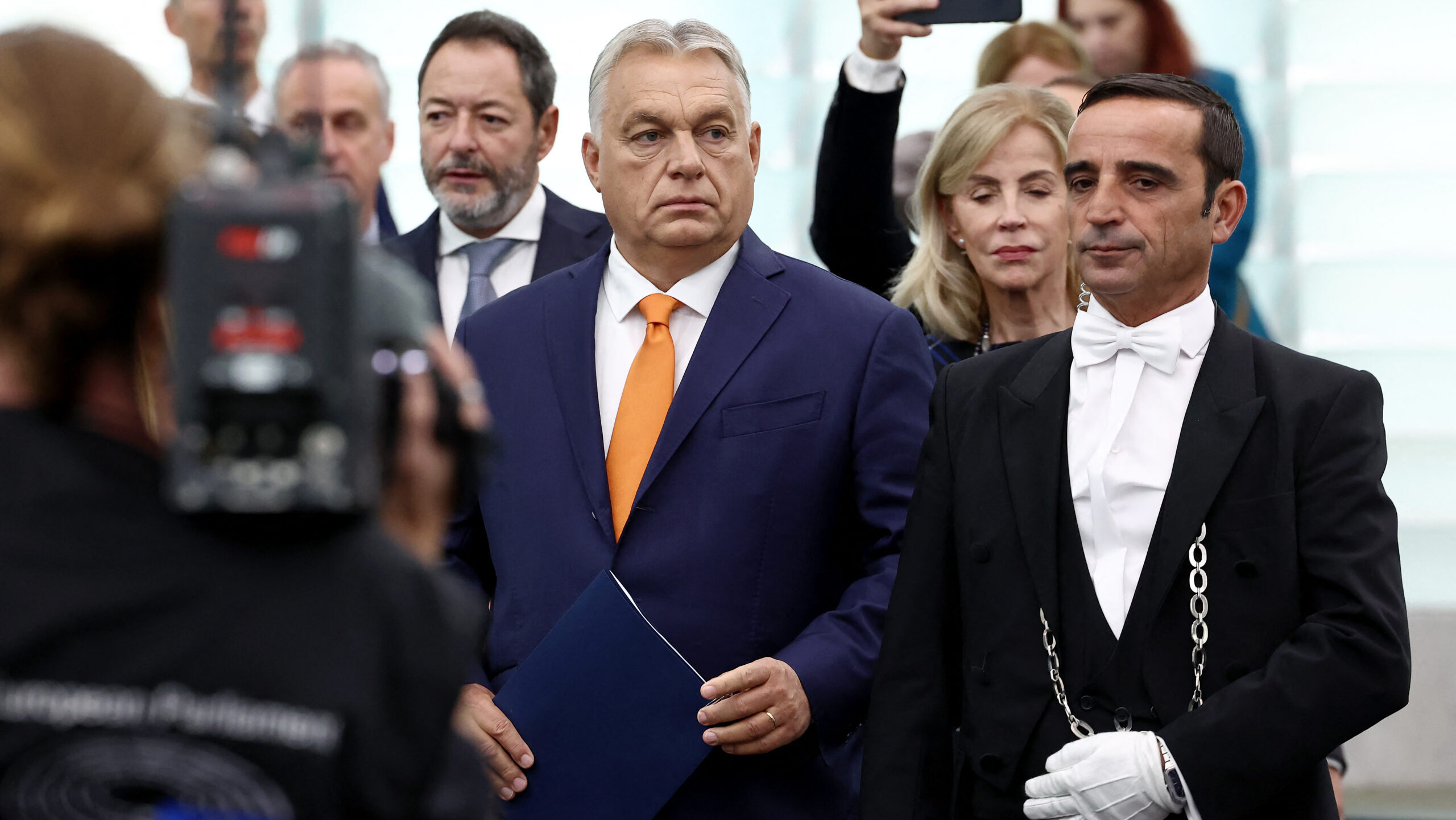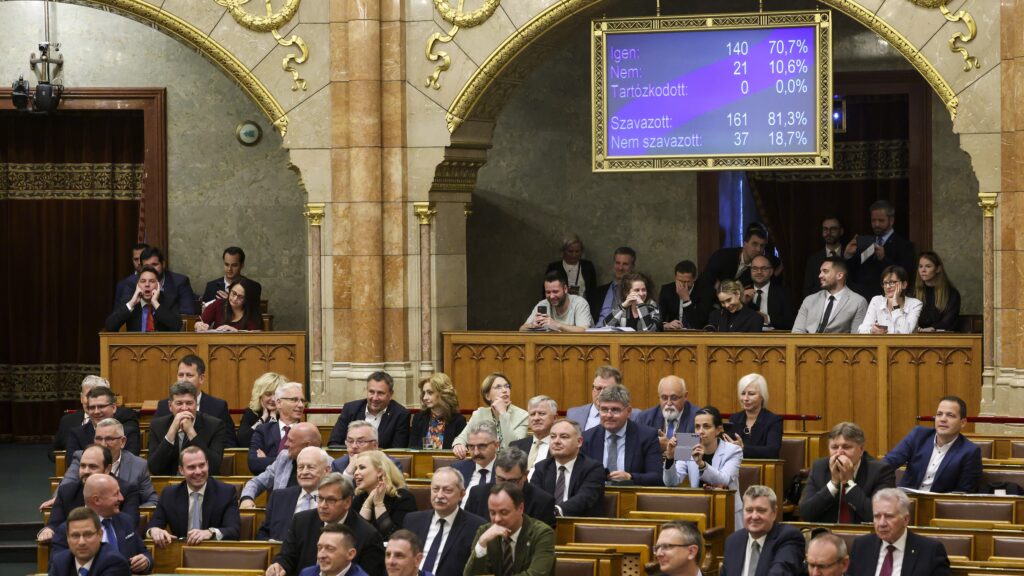Hungarian Prime Minister Viktor Orbán delivered a sharp rebuke to the European Union’s leadership after US President Donald Trump announced on Wednesday that peace talks to end the war in Ukraine would begin ‘immediately’. Calling both Russian President Vladimir Putin and Ukrainian President Volodymyr Zelenskyy to negotiate terms, the US leader conspicuously left the EU out of the process—a move that has thrown Brussels into despair and shock.
EU’s foreign policy chief Kaja Kallas issued a statement late Wednesday, alongside the foreign ministers of six European NATO countries—Germany, France, Poland, the UK, Italy, and Spain—, stressing that Europe must have a central role in any peace negotiations. ‘We look forward to discussing the way ahead together with our American allies,’ the statement read.
Kaja Kallas on X (formerly Twitter): “Ukraine’s independence and territorial integrity are unconditional.Our priority must now be strengthening Ukraine and providing robust security guarantees.In any negotiation, Europe must have a central role.Our Weimar+ statement ↓ pic.twitter.com/PfdvQ4UND1 / X”
Ukraine’s independence and territorial integrity are unconditional.Our priority must now be strengthening Ukraine and providing robust security guarantees.In any negotiation, Europe must have a central role.Our Weimar+ statement ↓ pic.twitter.com/PfdvQ4UND1
According to Orbán, however, that is unlikely. ‘This declaration is a sad testament to Brussels’ failed leadership,’ he wrote in a post on X. The Hungarian prime minister added that one cannot simply demand a seat at the negotiating table—it must be earned ‘through strength, good leadership, and smart diplomacy’. Orbán also condemned the EU’s pro-war stance, which is, following Trump’s inauguration, now the only major power still committed to such a position. He called this ‘morally and politically unacceptable’.
Orbán Viktor on X (formerly Twitter): “This declaration is a sad testament of bad Brusselian leadership. While President @realDonaldTrump and President Putin negotiate on peace, EU officials issue worthless statements.You can’t request a seat at the negotiating table. You have to earn it! Through strength, good… https://t.co/Q1hevzk6I7 / X”
This declaration is a sad testament of bad Brusselian leadership. While President @realDonaldTrump and President Putin negotiate on peace, EU officials issue worthless statements.You can’t request a seat at the negotiating table. You have to earn it! Through strength, good… https://t.co/Q1hevzk6I7
Surprise from Washington
As Hungarian Conservative reported, Trump held a lengthy telephone conversation with Putin on Wednesday, during which the two agreed to begin negotiations aimed at ending the war in Ukraine. After the call, Trump posted on Truth Social that he and Putin had agreed to work together closely, including making reciprocal visits. According to the Kremlin, Putin invited Trump to Moscow for further discussions, but Trump later revealed that they would meet in Saudi Arabia instead.
Shortly afterward the US president also called Volodymyr Zelenskyy, who shared details of their conversation on X. ‘Together with the US, we are charting our next steps to stop Russian aggression and ensure a lasting, reliable peace,’ he stated. ‘As president Trump said, let’s get it done.’ He added that they had ‘agreed to maintain further contact and plan upcoming meetings’.
Before Trump’s surprise calls, US Secretary of Defence Peter Hegseth had told NATO defence ministers in Brussels that Washington was gradually withdrawing from Europe to focus on security threats closer to home—primarily China. The Pentagon chief also outlined the US vision for peace, dismissing Ukraine’s NATO membership aspirations as unrealistic within the current negotiations. Hegseth further stated that it was unlikely Ukraine would regain all its pre-2014 borders, suggesting that Kyiv could face significant territorial losses, including Crimea.
Quo Vadis, Europe?
These announcements have left EU leaders reeling. Over the past three years, most EU member states have provided substantial humanitarian and financial aid to Ukraine, in addition to transferring much of their military equipment—only to be sidelined when the time for negotiations arrived. This is also a severe blow to the EU’s prestige, further diminishing its international influence, which has already waned due to economic struggles linked to the loss of cheap Russian energy and the sanctions imposed in an effort to weaken Moscow.
The situation is increasingly dire. As progressive mouthpiece POLITICO noted on Thursday, Europeans should hope merely to be in the same building—let alone at the negotiating table—when talks begin. ‘Europeans had three years to assert themselves and uphold the liberal order by putting Ukraine in a position of strength; they failed the test, and now Putin is in a position of strength,’ wrote foreign policy analyst Ulrich Speck on X. This assessment is particularly stark given that Russia’s military spending in 2024 has surpassed that of all EU member states combined.
Yet this outcome is hardly surprising. Orbán and Hungary have long advocated for change in Brussels, viewing the current EU leadership as corrupt, weak, and pursuing a flawed strategy on multiple fronts, including Ukraine. With the US stepping back, the continent could be facing extremely challenging times ahead—challenges its current leadership seems ill-equipped to handle.
Related articles:








